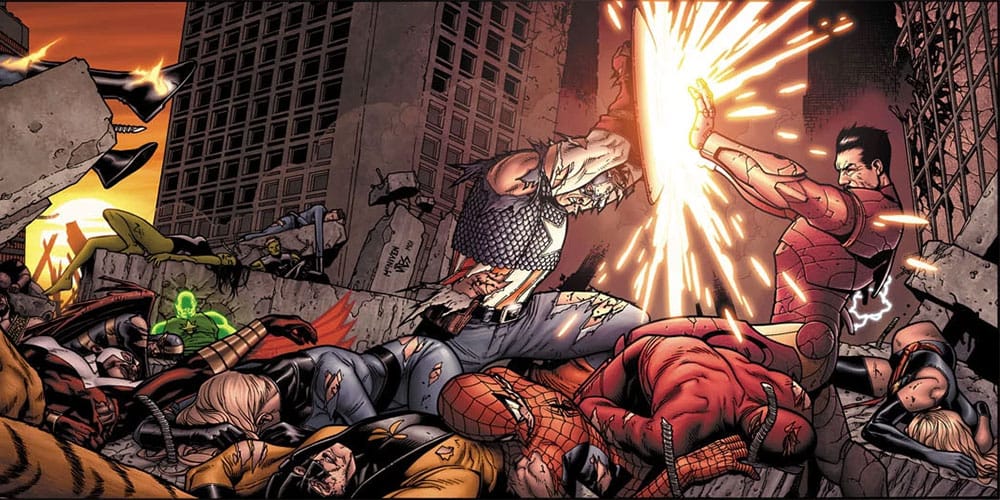
Civil War has a reputation that precedes it due to the billion-dollar movie it spawned and ramifications that it had on the Marvel Universe.
This groundbreaking arc compiled over 100 issues and brings together a whole host of characters including A-Lister’s all the way to the most obscure.
Whilst it’s quality has been disagreed en masse since its release in 2006, for better or worse it definitely has left its mark.
But does it still hold up?
That’s what I’m here to find out.
Throughout this review I will be breaking down everything that you need to know about the entire run and letting you know my overall thoughts on it and whether it is still worth picking up. There will be heavy spoilers here, so if you don’t want to know anything then I highly suggest that you skip to the score.
For everyone else let’s dive into Marvel Civil War!
9/11 Allegory
The main premise of the arc revolves around those with superhuman abilities being forced to register with the government after a devastating attack on home turf.
If you weren’t already aware this piece is clearly a response to 9/11 and the divisive aspects that came forth from those attacks. Whether it’s the loss of privacy, the Guantanamo bay-esque prisons or the fact that there is even a section about the superhero Illuminati, everything seems to tie back to those initial attacks in one way or another and early on this makes the book easy to relate to, especially if you remember just how World changing those events were.
Even just reading the opening storyline which mentions how the Illuminati group of superhumans were aware of some attacks on Earth before they took place is a clear tie in to Al Qui’ida/The CIA and the book is awash with metaphors and symbolism that, if applied to our world, shows how close we came to caving in on ourselves due to the far rights opposition to the lefts and vice versa.
In the opening chapter, they take away Bruce Banner/The Hulk’s rights when they banish him to Sakar and throughout the story, the work hammers home that the side that is labelled ‘correct’ is protecting through oppression and stripping away the rights of people for the ‘greater good.’ This, of course, is what governments today are criticised for and early on its clear that Civil War is as relevant today as it was on its first printing.
Through Eyes Of The Webhead
Peter Parker is arguably the most interesting character of the entire arc and he by far goes on the most interesting journey. Initially, he is loyal to Tony Stark even to the point that he is willing to give up his own freedom, unmask to the world and put himself in the crosshairs.
However, throughout the book he begins to question the motives of those around him and this eventually leads to him defecting. To me this is a metaphor for the Iraq War and how public favour which was initially positive for it, turned against it after realising the atrocities that our governments were committing.
His ‘coming out’ party really shakes up the superhero world whilst cementing him as arguably one of its most important. Here is an idealistic boy that for better or worse wants to believe in something good and he is willing to put his life on the line because of it.
I loved watching the turn in him and seeing him battle against Tony, who represents the Government, and this works perfectly as a metaphor for the uprising. Whilst someone like Steve Rogers, sees the good in the registration act what he’s actually fighting for is the fact that the choice of whether to sign up or not has been taken away and this is against the American Way which is of course, something that he is supposed to stand for.
Peter embodies the voice of the people and ultimately showcases how, if it does not fit with the agenda, that it is often snuffed out. Ultimately the registration leads to regulation and similar to today’s current climate, acts within the book are often decided upon instead of acted on instinctively. This politically correct mind state that forces restraint can be as damaging as wailing in without thought and the book does a fantastic job of making the reader question how each action should be handled, making for an engaging storyline throughout.
Peter pays the biggest price, losing Aunt May in the process and though he stood up for his principles you wonder, was it all worth it?
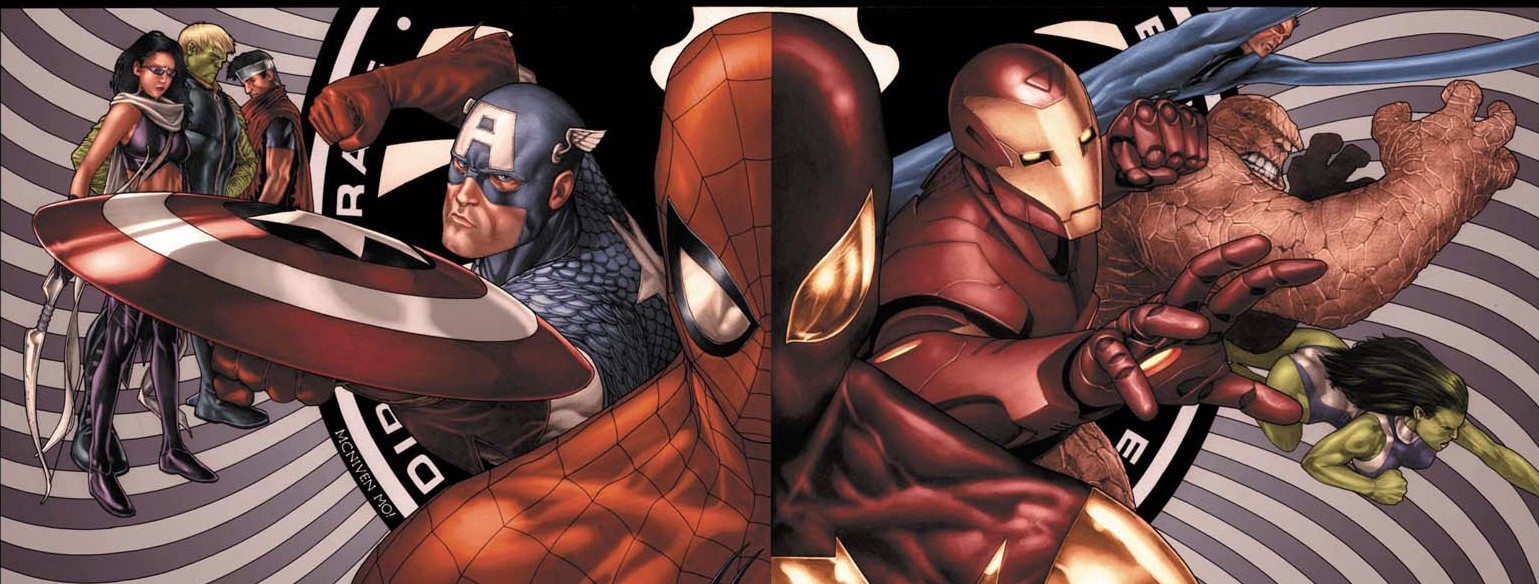
The True Villain
Of course, every storyline needs a villain and if anyone fits that guise it’s Tony Stark. Though predominantly a hero in other works, Stark is this pieces true villain. He ravenously plays the system, impedes on the rights of his friends and even fakes an attack on himself in order to get his way. He manipulates those around him into thinking that the registration act must be passed because in his mind it is for the greater good.
It’s this perception that really makes you rally against him and though marvel wanted readers to pick a side in this conflict, I found it difficult to agree with him.
Ultimately Iron-Man is the face of the registration but he too bears the cons of that, even being spat at at a funeral by a woman whose child died in the Stamford incident. Stark, for better or worse is forced on a path that even he may regret but is too late to divert from and whilst the dislike towards him should be there, readers are also able to understand his motives making him an engaging antagonist.
He and Captain America have a stellar stand off in the ‘Casualties Of War’ Book which acts as a recounting of all the times throughout the past that they’ve come head to head and repaired their relationship. It’s also the most clean cut depiction of both of their viewpoints and showcases the world through their eyes and why they’ve come to make the decisions that they have. It also hints as to why Captain America will ultimately lose as he’s not only fighting the full force of The US but also his hero.
However, even though Tony wins, it still feels like he lost in some ways. The boy he treated like a son despises him, his true identity is revealed, the majority of his closest allies are now enemies, his enemies are now his allies and any further battles in the future will be infinitely more difficult to coordinate because of this.
Throughout the arc Tony is seen outside of his suit less and less and this highlights that he has some shame as seeing the act play out. He is unwilling to put his face to the conflict as ultimately…deep down, he knows it’s wrong.
In the end he confesses that it wasn’t worth it and it’s a real gut punch that reminds us that the path to hell is paved with good intentions.
It’s A Bad Time To Be A Hero
Juxtaposing this is the other side of the coin: Captain America. After refusing to become an assassin tasked with tracking down those who refuse to join the registration, Cap transforms into a true hero, willing to put principle above the easy way out.
What’s most harrowing about his tale is that he shouldn’t even be there. In his mind he should have died in the ice sixty years ago and throughout the book you are forced to question whether he is truly relevant to modern society or just fighting a battle that does not really need his input.
It’s outstanding work and it paints him as perhaps an idealistic that isn’t able to comprehend today’s standards. That doesn’t mean he’s necessarily out of the fight though.
He is an unstoppable force, tasked with combating an immovable object and due to his firm stance it becomes easy to see why heroes and villains would join his side.
In his end his surrender means that even more destruction is averted and even though on the surface it perhaps seems like an acceptance of Iron Man’s Vision, it’s actually the opposite.
Steve opposes the corruption and by handing himself over to the authorities as Steve Rogers and not Captain America, showcases that this law will eventually spread to all people, oppressing those who are willing to do good no matter if the government allow it or not.
It’s a shining example of corporations stamping out the little guy that can still be seen today in acts like Article 13 and more.
In the end, Steve dies in the final few issues of the run and this sets up a Marvel Universe where sometimes, even the good guys lose.
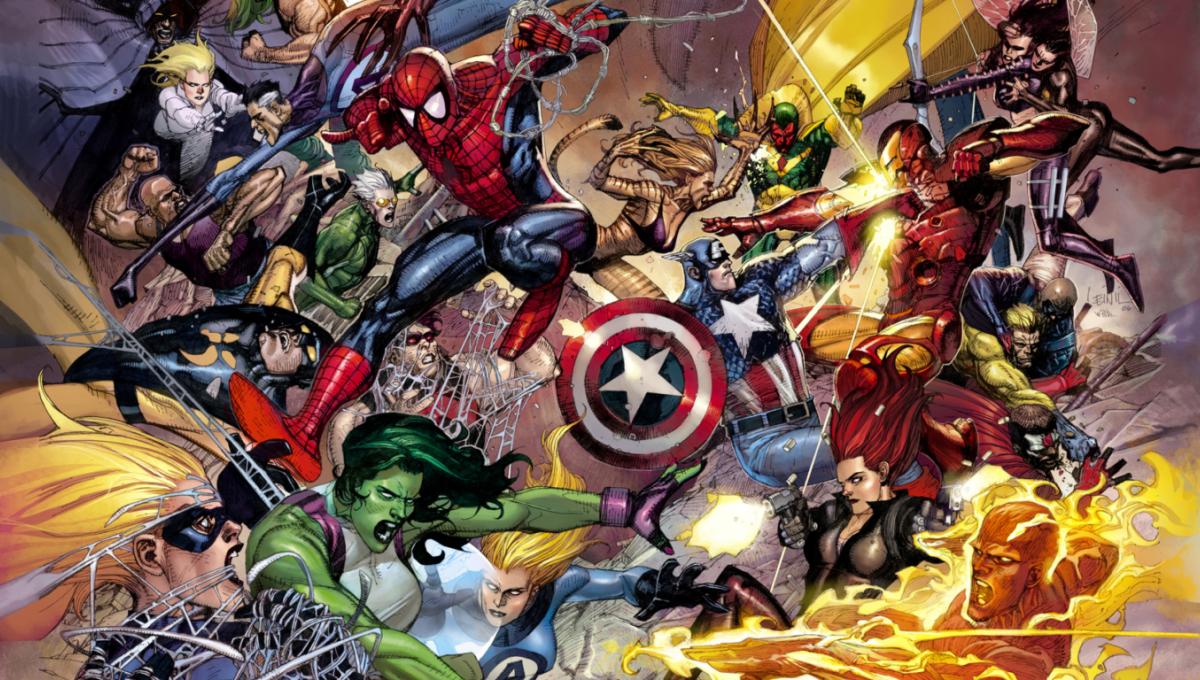
The Hypocrisy
Ultimately the work does an outstanding job of showcasing the hypocrisy that often exists within Government. In the case of She Hulk she fully supports the registration publicly, however, she too wishes to retain her private life as Jennifer Walters and this plays on the fact that as a people we want all of the protection that comes with extended surveillance but none of the impeaches on our privacy.
At the end of the day the Resistance realise that if the law changes every time someone sets off a bomb that eventually, the bombers will win. It’s an outstanding analogy that really takes a look at the impact of terrorism on our world and how it effects things beyond the initial explosion.
It begs the question, ‘what makes a hero?’ Should people who save someone from drowning have to register? Will firefighters be subject to the same laws? Surely registration must reach every aspect of society in order to be fair.
We also get hints at how suppression, in order to save lives, can often lead to a higher bodycount. In the Cable and Deadpool issues that span the run, the former states that in forcing super humans to register, a totalitarian state will eventually evolve from this and lead to an uprising amongst the people that will devolve the country into all out war. The writers clearly know their history and use examples from the real world to demonstrate this in expert fashion which further enforces just how poorly thought out that the registration act is.
Obviously, it questions the law on several levels and brings up how aspects like Slavery too were once deemed lawful and now are looked back on with terror. This forms a question at the heart of the book which is, ‘if something is wrong, is it ok to carry it out just because the Government says that it is?’ Civil War, whilst not answering it outright definitely leaves you with enough perspective to answer it for yourself and this internalising of its issues is arguably it’s greatest selling point.
Wakanda Forever
One of the most interesting aspects of Civil War is how other countries react to the registration act. Canada becomes a harbour for refugees on the run from the Government and Wakanda steps forward to be a largely dissenting voice
Using his political power, King T’Challa aka The Black Panther, is able to sway public opinion with his wife Storm.
Tony warns them to not step into the firing line but they disregard this and this throws America to blows with the rest of the world which it is often criticised for in real life.
Eventually, T’Challa ends up supplying Captain America with weapons and taking them to the negative zone and this shunning of the act sums up the rest of the world’s feelings towards the act.
The War
Of course, a comic book about war is only as good as its action and this story doesn’t disappoint. Whether it’s pure battles on the page or Ancient Rome metaphors of the fall of Caesar being splashed across the panels, everything feels deliberate and enthralling.
The battle that results in Goliath’s death that comes in Civil War 4, is one of the best standoffs ever put to print and it’s a phenomenal read. You get the real feeling that this massively changes the landscape of the war and the comic expertly weaves it’s political subtext into the earth-shattering standoffs that make up it’s inner pages.
Whether it’s watching Iron-Man tear Cap apart due to his armours algorithms being able to predict his next move or the clone of Thor showing up, everything feels epic across the board.
These are the kinds of ‘who would win in a fight’ debates that you used to have on the playground come to life and it’s outstanding to watch.
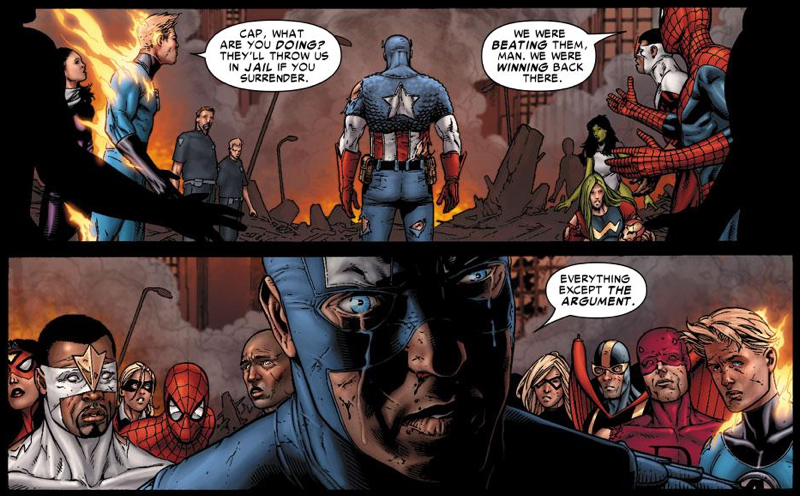
The Side Stories
With the arc being 100 issues long, solid side stories are needed to and those in Civil War really pack a punch.
We get an intellectual look at the conflict with the fantastic four in a story that would go on to influence the film Thor, years later, and Wolverine goes on the trail of Nitro who caused the Stamford incident.
What the entire run does expertly is that it takes you through every aspect of The Marvel Universe and it creates emotional and insightful arcs that not only add a deeper context to the overall work but provides a huge source of enrichment that exemplifies quality storytelling.
Whether you’re watching Captain America go head to head with Iron Man or following Ben Urich trying to simply report on how the world has changed in Frontline, everything works together cohesively to improve the storyline.
Seeing Robbie Baldwin aka Speedball, a hero who was present at the Stamford incident and refused to register, get slowly passed through the prison system is fascinating and exemplifies how the those who stick by their principles are often bullied into submission in order to see things the ‘right’ way. His tale is a stellar one with callbacks to Lee Harvey Oswald and other media. He’s a rebel that refuses to bow to the system and his story showcases just how harsh and impeaching the battle for freedom is.
In war we often are looking in the wrong direction. Whilst our attention is drawn to the battlefield, it’s often the politicians who are making the real and everlasting decisions that shape the conflict and Civil War beautifully demonstrates this in a cohesive and engaging manner.
Whilst not everything is essential or even enjoyable (I’m looking at you Runaways) the pros far out weigh the negatives. Getting items like the civil war files which break down who’s side each character is on is enriching in several ways and all of these add ons are definitely worth seeking out as they expand the run in many intriguing ways.
The Conclusion
Civil War is still as relevant today as it was upon first printing. It’s the classic ‘I was just following orders’ idealism that we heard from The Nazis and more vs the ‘You have to stand up for what’s right even if it means breaking the law’ mentality that becomes prevalent when the population questions the government.
These are old ideas but they are told in such a fresh and invigorating way through the page that it becomes hard to critique it.
Comic books are often viewed as simplistic and for children, however, works like Civil War exemplify that they can go beyond that and provide social commentary in a world that sorely needs it.
It’s an outstanding storyline that due to its breadth and scope is able to cover all ideologies and points of view whilst providing balance to both sides of the argument.
Civil War is a masterpiece and there’s never been a better time to pick it up and that’s why it gets a…
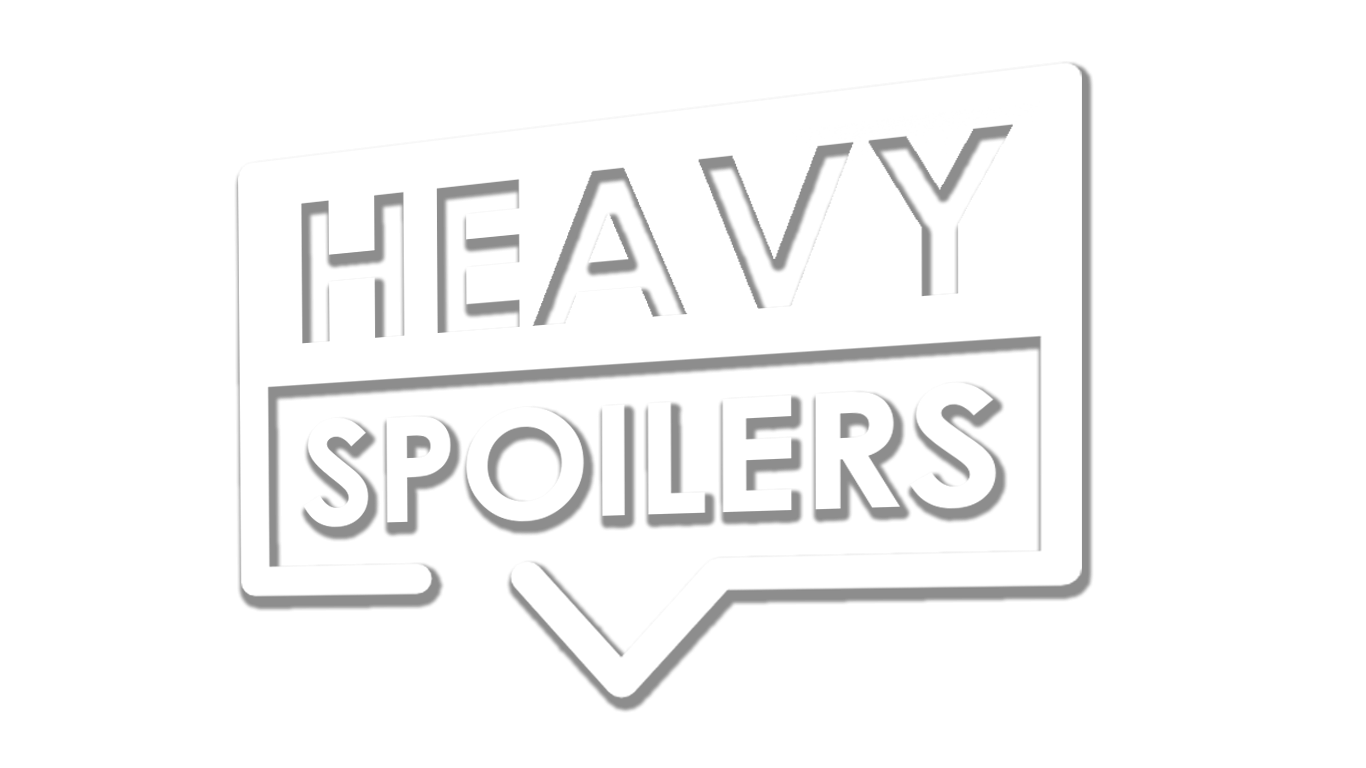


Leave a Comment
You must be logged in to post a comment.